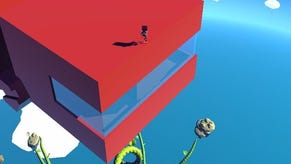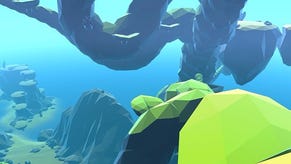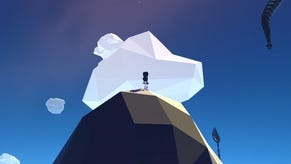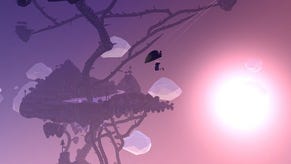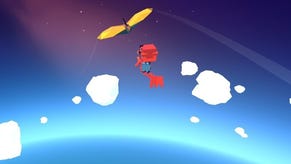Games of the decade: Grow Home is a game about space and giving people space
Leaf it out.
I did a bit of gardening this morning. I didn't want to. I had been putting it off. So many memories! But then I thought: enough. I got right to it and pulled up all the weeds. It took about two seconds. And on the other side of those two seconds the landscape was transformed.
There are so many reasons to love a game like Grow Home, but one of the greatest is this: here is a game world that I helped to build. Grow Home's vertical playground - sandy beach reaching upwards via floating boulders to wonderful mini-islands, waterfalls, forests and mountains - is beautifully designed. It's full of secrets. It's full of potential for open-ended play, for clear, wholesome distraction, which is just about the best currency video games can trade in. But on top of all that are the vines. Grow Home is a game about coaxing a plant up from the earth and high into the sky, so that the little robot you control can get back to his spaceship. You do this by riding vines off the center of the plant, sending them bucking and twisting through the sky towards the rocks you plug them into. This means that you're adding as much to the landscape as was already there. You're putting your touch to it. These vines, which you are sort of in control of, mean you can sort of embellish the world and create new parts of it.
Grow Home is full of this stuff. People think it's going to be like QWOP, a game about awkwardness, because your little robot is powered by physics and has to climb each surface by gripping and releasing his two hands. But it's not about awkwardness. It's about the balance of happy accident and growing mastery. You learn how to be this robot. You learn how much he weighs, how high he can jump, how long he can fall and still be safe when he lands.
And while you're learning all that you're learning about the landscape too. You're learning about the flowers you can grab that ease you lazily back to earth. You're learning about the fast travel points you can unlock - this is glorious - by grabbing the thick plastic feet of them and folding them down onto the ground. You learn about the plant life, the animal life. You learn about each island you reach, and you learn to explore every inch, find every cage, every stone arch, every glowing doodad that must be plucked from the ground like a tooth, everything channeled through that simple process of grabbing and releasing.
The end result? This is the most euphoric game I have played in a decade. The most generous. It's also the most moving, I would argue: a bird's eye view of childhood and its rickety pleasures, informed a little, I think, by the floating anxiety of the parent. Back in the sky, back far far above the sandy beach and the floating islands and the creepers and the asteroids, is the spaceship where the robot's computer waits for his return. The computer's called MOM. This is a game about giving your children the distance they need to be a part of nature, while ensuring that they remain safe. Five years after its release, I have yet to play anything as good.






